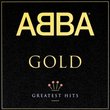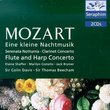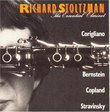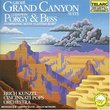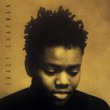| All Artists: Wolfgang Amadeus Mozart (Composer), Alan Hacker (Clarinet), Lesley Schatzberger (Basset Horn), Salomon String Quartet Title: Wolfgang Amadeus Mozart: Clarinet Quintets Played on Original Instruments (Clarinet Quintet in A, K581 / Clarinet Quintet fragment in Bb, K516c / Quintet fragment in F for Clarinet, Basset Horn & String Trio, K580b) - Alan Hacker / Lesley Schatzberger / S Members Wishing: 0 Total Copies: 0 Label: Amon Ra Release Date: 3/6/1995 Album Type: Import Genre: Classical Styles: Chamber Music, Historical Periods, Classical (c.1770-1830) Number of Discs: 1 SwapaCD Credits: 1 UPCs: 750582235320, 5013133301727 |
Search - Wolfgang Amadeus Mozart (Composer), Alan Hacker (Clarinet), Lesley Schatzberger (Basset Horn) :: Wolfgang Amadeus Mozart: Clarinet Quintets Played on Original Instruments (Clarinet Quintet in A, K581 / Clarinet Quintet fragment in Bb, K516c / Quintet fragment in F for Clarinet, Basset Horn & String Trio, K580b) - Alan Hacker / Lesley Schatzberger / S
 | Wolfgang Amadeus Mozart (Composer), Alan Hacker (Clarinet), Lesley Schatzberger (Basset Horn) Wolfgang Amadeus Mozart: Clarinet Quintets Played on Original Instruments (Clarinet Quintet in A, K581 / Clarinet Quintet fragment in Bb, K516c / Quintet fragment in F for Clarinet, Basset Horn & String Trio, K580b) - Alan Hacker / Lesley Schatzberger / S Genre: Classical
This is a fascinating item for Mozart specialists. Scholars now suspect that Mozart wrote both his great Clarinet Quintet and the Clarinet Concertos for a lower- pitched version called the basset clarinet, and that is wha... more » |
CD DetailsSynopsis
Amazon.com This is a fascinating item for Mozart specialists. Scholars now suspect that Mozart wrote both his great Clarinet Quintet and the Clarinet Concertos for a lower- pitched version called the basset clarinet, and that is what Alan Hacker plays here, in a very mellow, slowly paced version of the work. The disc is filled out with completions of two fragmentary late Mozart works by one Duncan Druce. They aren't 100% Mozart, but they are interesting. For a more conventional version of the Clarinet Quintet on period instruments, coupled with other genuine Mozart, try Music from Aston Magna (Harmonia Mundi HMU 907059). --Leslie Gerber Similarly Requested CDs
|
CD ReviewsAt the Front with Amadeus Giordano Bruno | Wherever I am, I am. | 04/12/2008 (5 out of 5 stars) "Mozart has become a battlefield. The battle is between Traditionists and Reversionists, if you'll accept my coined labels for two schools of thinking about the performance of Mozart. The Traditionists are those who find great value in the playing tradition of 20th Century orchestras and tehir conductors, and who in a sense believe that music progresses through such tradition. The Reversionists generally reject the playing tradition of the 20th Century as a distortion of the composer's musical intentions, something like the layers of varnish and disfiguring restorations on a painting by a Renaissance master. The recent recording of Mozart's Prague and Jupiter symphonies by Rene Jacobs, an ardent Reversionist, is a good example - scorned by some, acclaimed by others, revealing a fierce polarizing partisanship. This battle has been fought most prominently over the question of "authentic, original" instruments. Unquestionably the "historically informed" Reversionists have swept the field in the performance of Bach and Handel, and of everything earlier. Just a few weeks ago, in San Francisco CA, the San Francisco Symphony and the historically informed Philharmonia Baroque Orchestra both performed Handel's celebratory Te Deum on the same weekend. SF Chronicle music critic Joshua Kosman, usually no friend of the Reversionists, declared victory for Philharmonia, as did the thunderingly enthusiastic audiences for that "authentic instrument" ensemble. This CD by clarinetist Alan Hacker and the Salomon String Quartet is thoroughly Reversionist. The instrument for which Mozart composed his sublime quintet and concerto was not the modern clarinet but rather an instrument with an extended lower range and far fewer keys, called a basset horn. In the quintet, the difference is merely a handful of low tones in the larghetto movement. I have to say that those low, low notes are lovely, lovely, but the Clarinet Quintet sounds beaucoup lovely on the modern licorice-stick also. I suspect someone could perform that music on a kazoo and I'd still find it lovely. The biggest difference that I hear on this CD is in the sound of the strings. The Salomon performs with gut strings and pre-Paganini bows. To my ear, the gut strings sound mellower and yet more expressive than the modern metal strings used by symphonic violinists, and the total blend of gut strings with the clarinet timbres seems as rich and chocolatey as a fine Bordeaux wine. Hacker plays his modified clarinet very beautifully, with heart-rending pathos in the larghetto balanced by folksy playfulness in the allegretto. This is the performance of the Quintet which I listen to most often. I wouldn't be so rash as to declare it "the best ever." There are many spectacular recordings of the Clarinet Quintet. If you love the work as much as I do, you'll want more than one, and I strongly recommend including this one among your choices." From the review in Gramophone Record Collector | Mons, Belgium | 02/25/2007 (5 out of 5 stars) ""Mozart's Quintet, like his Clarinet Concerto, survives only in an arrangement his publisher made after his death. As has been realized only recently, he wrote them for a clarinet with an extra joint at the bottom which added a third to the range. When this instrument failed to catch on, Mozart's publisher adjusted the very low notes to make the solo part playable on standard clarinets. The most recent Eulenburg score of the Concerto includes a page showing Alan Hacker's suggestions as to what Mozart himself probably wrote, and they seem to me wholly convincing. Oddly enough there are not nearly so many of these low notes in the Quintet and no adjustments at all are needed in the slow movement or in the main section of the Minuet. But the finale does benefit from Hacker's use of a modern extension on his early nineteenth-century clarinet. The stringed instruments on this record would also have met with Mozart's approval, and the result is an interesting performance of unusual authenticity. Both repeats are made in the first movement. The tempo of the slow movement does seem a little too slow to me, as does that of the Adagio variation in the finale, but the playing is nicely expressive and I liked Hacker's modest decorations in the slow movement reprise.
"The other two pieces were also meant for an extended clarinet, but Mozart never finished them. This need not be much regretted as regards the first one, but the much longer fragment with parts for basset horn and only three stringed instruments is lovely. Why did Mozart lose heart? Duncan Druce's completion is convincing and allows us to get to know some beautiful music. Sound quality on this record is first rate, as is the balance." " |

 Track Listings (6) - Disc #1
Track Listings (6) - Disc #1